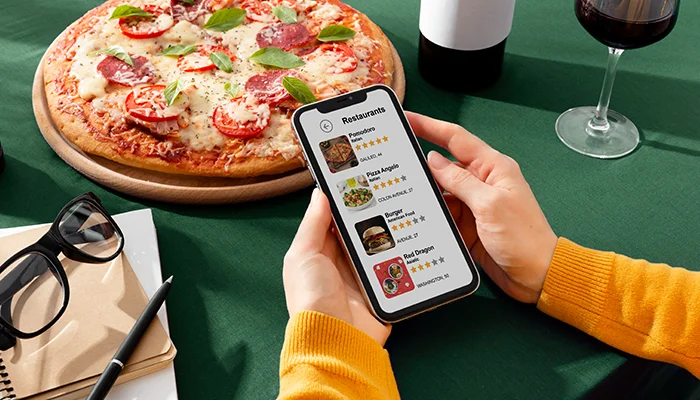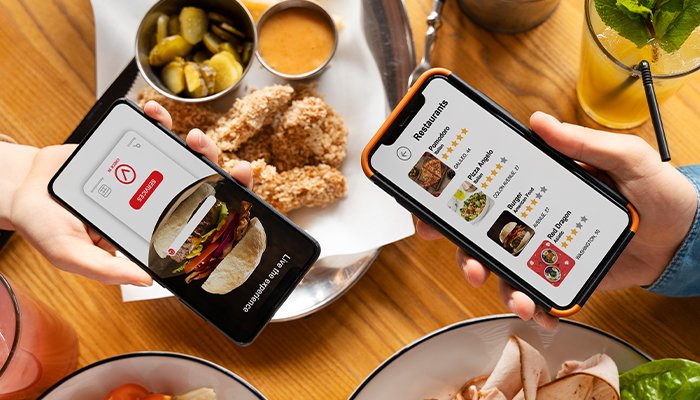How Much Does It Cost to Build a Food Delivery App Like Menulog?

JUL, 30, 2024 15:30 PM
How Much Does It Cost to Build a Food Delivery App Like Menulog?
The food delivery market has witnessed significant growth over the past decade, driven by the increasing demand for convenience and the proliferation of smartphones. Apps like Menulog have revolutionized the way people order food, providing a seamless and efficient experience for both customers and restaurant owners. For businesses looking to enter this lucrative market, understanding the cost of building a food delivery app like Menulog is crucial.
In this comprehensive guide, we will explore the various factors that influence the cost of developing a food delivery app, the essential features required, and provide a detailed cost estimation. Whether you're a startup or an established business, this guide will help you plan your investment and understand the intricacies involved in creating a successful food delivery app.
Key Factors Influencing the Cost of a Food Delivery App
1. App Complexity and Features
The complexity of the app and the range of features it offers are the primary determinants of the development cost. A basic app with essential features will cost less than a comprehensive app with advanced functionalities.
2. Platform Choice
Deciding whether to build your app for iOS, Android, or both will impact the cost. Developing for both platforms will typically require more resources and increase the overall cost.
3. Design and User Experience
Investing in a high-quality, intuitive design is crucial for user engagement. The cost will vary based on the complexity of the design, the use of animations, and the overall user experience.
4. Development Team
The choice of your development team, whether in-house or outsourced, will significantly affect the cost. Hiring a team with extensive experience in app development, especially in the food delivery domain, is essential.
5. Backend Development
The backend infrastructure, including servers, databases, and APIs, plays a crucial role in the app's functionality. The complexity and scalability of the backend system will influence the cost.
6. Third-Party Integrations
Integrating third-party services such as payment gateways, geolocation, and social media logins can add to the development cost. These integrations enhance the app's functionality and provide a better user experience.
7. Testing and Quality Assurance
Ensuring the app is bug-free and performs well across different devices and operating systems requires rigorous testing. Quality assurance is a critical step that affects the overall development cost.
8. Maintenance and Updates
Post-launch, the app will require regular maintenance, updates, and support to fix bugs, add new features, and ensure compatibility with new OS versions. This ongoing cost should be factored into the overall budget.
Essential Features of a Food Delivery App
To build a successful food delivery app like Menulog, it is essential to incorporate the following features:
1. User Registration and Login
- Social Media Login: Allow users to sign up or log in using their social media accounts for a seamless experience.
- Email and Password: Provide the option for users to register using their email and password.
2. Restaurant Listing
- Search and Filters: Enable users to search for restaurants and filter results based on cuisine, ratings, delivery time, etc.
- Restaurant Profiles: Detailed profiles with menus, prices, ratings, reviews, and contact information.
3. Menu and Ordering
- Menu Display: A detailed menu with images, descriptions, and prices.
- Customization: Allow users to customize their orders (e.g., add toppings, choose portion sizes).
- Add to Cart: A simple and intuitive process to add items to the cart.
4. Payment Gateway
- Multiple Payment Options: Support for credit/debit cards, digital wallets, and cash on delivery.
- Secure Transactions: Ensure secure and encrypted payment processing.
5. Order tracking
- Real-time Tracking: Provide real-time updates on the order status, from preparation to delivery.
- Estimated Delivery Time: Display the estimated time of arrival for the order.
6. Ratings and Reviews
- User Reviews: Allow users to rate and review restaurants and dishes.
- Ratings: Display average ratings for restaurants and menu items.
7. Notifications
- Push Notifications: Inform users about order status, promotions, and updates.
- Email and SMS Alerts: Send notifications via email and SMS for important updates.
8. Customer Support
- In-App Chat: Provide an in-app chat feature for customer support.
- Help Center: Include a help center with FAQs and support articles.
9. Admin Panel
- Order Management: Manage and track orders, update statuses, and handle cancellations.
- User Management: Manage user profiles, reviews, and ratings.
- Restaurant Management: Add, edit, and manage restaurant profiles and menus.
Cost Breakdown of Building a Food Delivery App

1. Discovery and Planning Phase
This phase involves understanding the requirements, conducting market research, and creating a detailed project plan. It includes:
- Market Research: Analyzing competitors, target audiences, and market trends.
- Requirement Analysis: Gathering and documenting app requirements.
- Wireframing and Prototyping: Creating wireframes and prototypes to visualize the app's structure and flow.
Estimated Cost: $5,000-$15,000
2. Design Phase
Designing the app involves creating the user interface (UI) and user experience (UX). This phase includes:
- UI/UX Design: designing the app's look and feel, including screens, icons, and animations.
- User Testing: Conducting user testing to gather feedback and refine the design.
Estimated Cost: $10,000-$30,000
3. Development Phase
This is the most significant phase, involving front-end and back-end development. It includes:
- Front-end Development: Developing the user interface and ensuring responsiveness across devices.
- Back-end Development: Setting up servers, databases, and APIs to handle the app's functionality.
- Third-Party Integrations: Integrating payment gateways, geolocation services, and other third-party APIs.
Estimated Cost: $50,000-$150,000
4. Testing and Quality Assurance
Ensuring the app is bug-free and performs well involves:
- Functional Testing: Testing the app's functionality to ensure it meets the requirements.
- Performance Testing: Testing the app's performance under different conditions.
- Security Testing: Ensuring the app is secure and protected against vulnerabilities.
Estimated Cost: $10,000-$30,000
5. Deployment and Launch
Deploying the app to app stores and ensuring it is ready for users involves:
- App Store Submission: Submitting the app to the Google Play Store and Apple App Store.
- Post-Launch Support: Providing support to fix any issues that arise post-launch.
Estimated Cost: $5,000-$10,000
6. Maintenance and Updates
Ongoing maintenance and updates are crucial for the app's success. This includes:
- Bug Fixes: Addressing any bugs or issues reported by users.
- Feature Updates: Adding new features and improving existing ones.
- Compatibility Updates: Ensuring the app remains compatible with new OS versions.
Estimated Cost: $10,000–$50,000 per year
Detailed cost estimation
To provide a more detailed cost estimation, let's break down the costs based on different app complexities:
Basic Food Delivery App
A basic app with essential features such as user registration, restaurant listing, menu display, ordering, payment gateway, and order tracking.
Estimated Total Cost: $50,000-$100,000.
Mid-Range Food Delivery App
A mid-range app with additional features such as social media login, real-time order tracking, advanced search and filters, customer support, and an admin panel.
Estimated Total Cost: $100,000-$200,000
Advanced Food Delivery App
An advanced app with all the essential and additional features, plus advanced functionalities like AI-based recommendations, advanced analytics, multi-language support, and more.
Estimated Total Cost: $200,000-$400,000
Conclusion
Developing a food delivery app like Menulog involves significant investment and detailed planning. By understanding the various factors influencing the cost, businesses can make informed decisions and budget accordingly. The essential features, combined with a strategic approach to development, can result in a successful and profitable food delivery app.
At PerfectionGeeks Technologies, we specialize in delivering high-quality mobile applications tailored to meet the unique needs of our clients. Our experienced team is equipped to handle all aspects of app development, from initial planning and design to deployment and maintenance. Contact us today to discuss your project and get a customized cost estimation. Let us help you turn your vision into a reality and succeed in the competitive food delivery market.
FAQ: How Much Does It Cost to Build a Food Delivery App Like Menulog?
1. What are the main factors that influence the cost of building a food delivery app?
The cost of building a food delivery app is influenced by several factors, including:
- App Complexity and Features: The more complex the app and the greater the number of features, the higher the development cost.
- Platform Choice: Developing for iOS, Android, or both will affect the cost. Building for both platforms will typically cost more.
- Design and User Experience: High-quality, intuitive designs and user experiences require more investment.
- Development Team: Costs vary depending on whether you hire an in-house team or outsource to a development company.
- Backend Development: The complexity and scalability of the backend infrastructure impact costs.
- Third-Party Integrations: Integrating services like payment gateways and geolocation adds to the cost.
- Testing and Quality Assurance: Comprehensive testing ensures a bug-free app but adds to the budget.
- Maintenance and Updates: Ongoing maintenance and updates are necessary to keep the app running smoothly.
2. What are the essential features needed in a food delivery app like Menulog?
To build a successful food delivery app, essential features include:
- User Registration and Login: Options for social media login and email/password login.
- Restaurant Listing: Search and filter detailed restaurant profiles with menus and ratings.
- Menu and Ordering: Menu display with customization options and add-to-cart functionality.
- Payment Gateway: Multiple payment options and secure transaction processing.
- Order Tracking: Real-time tracking of orders and estimated delivery times.
- Ratings and Reviews: User reviews and ratings for restaurants and dishes.
- Notifications: push notifications, email, and SMS alerts.
- Customer Support: in-app chat and a help center.
- Admin Panel: Order management, user management, and restaurant management.
3. How long does it take to develop a food delivery app?
The timeline for developing a food delivery app varies depending on its complexity and the development process. On average, a basic food delivery app might take 3 to 6 months to develop. A mid-range app with more features could take 6 to 9 months, while an advanced app with comprehensive functionalities might take 9 months to a year or more. This includes time for planning, design, development, testing, and deployment.
4. What are the ongoing costs after the app is launched?
After launching a food delivery app, ongoing costs include:
- Maintenance and Bug Fixes: Regular maintenance is necessary to ensure smooth functioning and address any bugs or issues.
- Feature Updates: Adding new features and improving existing ones will keep the app competitive.
- Compatibility Updates: Ensuring the app remains compatible with new OS versions and devices.
- Server and Hosting Costs: Costs for servers, hosting, and database management.
- Marketing and Promotion: Continuous marketing efforts to attract and retain users.
- Customer Support: Providing ongoing support to users and handling queries or issues.
These ongoing costs can range from $20,000 to $40,000 per year, depending on the app's complexity and the scale of operations.
5. How can PerfectionGeeks Technologies help in developing a food delivery app?
PerfectionGeeks Technologies specializes in developing high-quality mobile applications tailored to meet the unique needs of clients. Here's how we can help:
- Expert Team: Our experienced team of developers, designers, and project managers has extensive experience in building food delivery apps.
- Comprehensive Services: We offer end-to-end services, including market research, requirement analysis, design, development, testing, deployment, and maintenance.
- Customization: We work closely with clients to understand their vision and create customized solutions that align with their business goals.
- Quality Assurance: Rigorous testing ensures a bug-free, high-performing app.
- Post-Launch Support: We provide ongoing support and maintenance to ensure the app's success.








